 Home > CR Interviews
Home > CR Interviews A Short Interview With Brian Wood
posted December 1, 2007
A Short Interview With Brian Wood
posted December 1, 2007

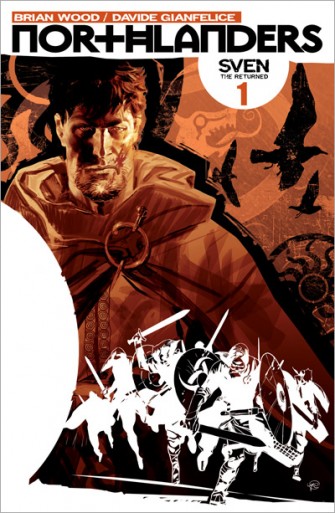
*****

It's been ten years since Brian Wood released
Channel Zero to a wave of critical acclaim and laudatory reaction from fans. In that time he's penned a significant number of graphic novels that draw on his interests in design, politics, relationships, emotional scarring and turning genres on their heads at every moment possible. His best-known works include
The Couriers,
Local,
Supermarket and
Demo, the last of which will soon be re-released in collected form by DC/Vertigo. His ongoing project
DMZ at Vertigo has been one of that line's solid performers as well as one of a recent wave of comics works lauded for their commentary on present-day policy, culture and circumstance.
Wood's latest is
Northlanders, with artist Davide Gianfelice, which begins serialization this Wednesday with an issue #1 sporting the cover seen above.
Northlanders is the story of Sven, a soldier in the employ of the Byzantine emperor who returns to his Viking homeland to seize a fortune he believes he's due. It's an odd title for Vertigo in a lot of ways: its visual dependency on open space, a rigorous approach to historical detail, and a rough, almost prickly examination of how we become the people that we become. I enjoyed my back and forth with Brian, who seemed as happy to talk about the theme work he's done on his new book as he was the background on his recent publishing deals. In addition to the two ongoing series and their resulting trade paperbacks, Wood recently wrote a book for DC's Minx line,
The New York Four, which will be published in 2008.
*****
TOM SPURGEON: What's it feel like to launch a new series in this market? Are you wary, cautious, optimistic...? Can you afford to be anything other than super-positive considering the potential message it might send out? For that matter, does it get any easier to launch new series?
BRIAN WOOD: I think I was stressing harder when I launched
DMZ, since I was basically breaking in at Vertigo, at least in terms of a monthly book, and I really had no idea at all what to expect. So with
Northlanders, I feel like I know what my floor is, I feel like I know that at a minimum it will be as successful a book as
DMZ is right now. But it's not like I'm kicking back relaxed about it. It's really a terrifying thing, launching a book, especially with the way a lot of other Vertigo books have recently launched. Everyone's seen the numbers or heard the talk online about how low they all are. So I've really been working at it, being super-positive like you said but also trying to be frank about the situation, especially talking to retailers -- which has been the focus of my promotion up until this week. They have to buy the book, for most of them sight unseen, with no way to return unsold copies, and sell them to a readership that, in increasing numbers, seems to prefer waiting for the collections. I really understand all that, and have been trying to get them as much information and help as I can scrounge up.
SPURGEON: I was looking at the Vertigo line-up and that's not a big publishing house. Do you have a sense of your place within Vertigo, what you might offer the line that they've decided not to get from someone else?
WOOD: God, how do I answer that? It's the impossible question. I want to say nothing, no, there's nothing I can offer Vertigo they can't get or have gotten from any of a number of true superstars they've published. My place within Vertigo... I guess I must have one. I'm sure my editor has an answer to that. But at the risk of sounding all "aw shucks" and humble pie, I don't think I write books like anyone else exactly and Vertigo's seen some value in what I do. I fit in somehow. I just don't know how exactly.
 SPURGEON: Some of the articles I've seen on
SPURGEON: Some of the articles I've seen on Northlanders
have latched onto elements of the story that they found to be trademark elements of your work. Now that you've been doing this for a while, do you feel that there are recognizable elements that cut across your work? What might they be? Do you feel comfortable having your work discussed in that way?
WOOD: It depends on how well-informed the discussion is. I liking hearing how my work is perceived by readers and how they would categorize my "style," but too often its a sweeping observation based on just one book, or one type of lead character. I grow very weary of snark, and just today someone pointed me at a review that said every single one of my characters was "privileged and white," which is, purely looking at the facts, just not true. But getting too upset about that is the path to madness, as is trying to correct people's ignorance.
I think there are a few commonalities, though.
DMZ and
Channel Zero are very political...
DMZ is in a lot of ways a stylistic follow-up to
CZ. I wrote a lot of wise-ass action books that were essentially all part of a series,
The Couriers, and the more recent
Supermarket was me deliberately revisiting that past, because it can be a lot of fun to write. I am never sure how to label books like
Demo and
Local, but those two absolutely fit together and are a big part of what I do. I know I do like writing about relationships, both romantic and also just how humans interact with each other. I like fucked-up emotions, flawed people, unconventional romances, sad stories, etc. It's just so much more interesting. Why should the guy get the girl at the end when instead, the guy could alienate the girl because he is so self-centered that any attempts to woo her fall flat and just expose what an emotional cripple he is? I guarantee you that is more accurate to real life and ten times as interesting a character study.
I just got done writing
The New York Four for
DC/Minx, which is about four girls starting college at
NYU. Each one has something wrong with them... we have an extreme recluse, a voyeur-turned-stalker, a user and manipulator, and a boy-crazy girl with no sense of boundaries. So much more interesting, in my mind, than a bookworm, an athlete, a tomboy, and the, I dunno, the girl who goes clubbing.
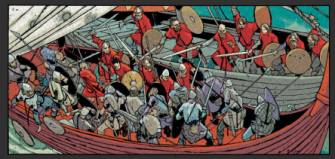 SPURGEON: You're rightfully pointed out that there's never been a good Viking comic. Why do you think that is?
SPURGEON: You're rightfully pointed out that there's never been a good Viking comic. Why do you think that is?
WOOD: I've not seen one that I personally like, no. I never really liked the mythological aspect of them, in comics or in history or literature. I think most comics, that I've seen, tend to put that stuff front and center and it immediately turns me off. I've always been more interested in the practical, day to day things, like how they built their boats, or the tactics of fighting in shield walls, what they ate, how they dressed, etc., all things that don't
seem like they would make for a ripping comic book. But I'm going to try.
SPURGEON: As a fan of Viking stories, what are some of your artistic touchstones in other media, and why?
WOOD: Just other books, fiction and non-. I did look at a lot of movies when I was writing the pitch for
Northlanders... nothing specifically Viking, but historical epics like
Gladiator and
Kingdom of Heaven. Actually,
The 13th Warrior was decent, adapted from the
[Michael] Crichton book
Eaters Of The Dead. Probably the best Viking movie out there. But I wanted to study what made these movies work. I want
Northlanders to have that sense of scope, that sort of epic-quality.
When I was in Iceland I bought a copy of what is supposedly
the Viking movie, called
The Raven Flies. And I quite enjoyed
The Virgin Spring, the
Ingmar Bergman film set in medieval Sweden, which is quite beautiful but a tough film to watch.
 SPURGEON: My understanding is that the Vikings more than any great civilization in world history have been subject to vagaries of history and art
SPURGEON: My understanding is that the Vikings more than any great civilization in world history have been subject to vagaries of history and art about
them: from centuries of being portrayed as monsters, but also including a strong romantic streak and today a much better understanding of their culture and their need for land acquisition. What strikes you about that people and their culture; what in particular interests you or has held your interest since a younger age?
WOOD: One thing that always strikes me is, as you said, their need for farm-able land and food sources. It's almost refreshing to think how, as a people, the Vikings invaded and conquered for such straight forward and understandable reasons... compared to the ideological reasons virtually everyone who's come after them for doing the same thing! That, couple with the fact that the Norse and Danes etc., readily assimilated themselves into the native cultures to keep the land they conquered shows a... I don't know. A pragmatism that I can respect.
SPURGEON: I'm not sure that I know the genesis of Northlanders. Where did you start, and at what point did it begin to cohere in your eyes into roughly the same story that is now being published?
WOOD: I was talking to
Steve Wacker, an ex-
DCU editor who I've known for a long time. We were kicking ideas around, thinking up old DCU properties that I might be able to bring back.
The Viking Prince was one of them, and even though I never pursued that particular title, but something had clicked in my head... I
liked Vikings, I always have, but up to that point it had never occurred to me that maybe I would want to write about them.
I was also in the middle of watching
The Yakuza Papers again, and I thought maybe I could write a Viking book for Vertigo, some dark and nasty crime saga set in that time period. That was how it started. My editor
Will Dennis had asked me for another project and made it clear he expected me to pitch something well outside of my "comfort zone." So that's what I did.
The final version of the pitch was a lot less dark, and it wasn't a crime story anymore. I would say it best resembles something like
Rome, the HBO series, in terms of style and tone. A stylized historical epic.
SPURGEON: Can you talk a bit about the breadth and depth of your research on the project? I read that you went to Iceland, but I'm not exactly sure what you did there.
WOOD: I have a compulsion for collecting research. I'm serious when I say it's part of my OCD. I buy a lot of books, I read as much as I can, and yeah, in the case of
Northlanders, I went to
Iceland. It doubled as my honeymoon so it wasn't pure research, but I went to all the museums, looked at the original
Saga manuscripts, visited ruins and other places of historical interest. I soaked up what I could, took hundreds of photos for my artist, and spent a lot of time thinking about this series. And this is a comic book -- I'm not writing a thesis or an academic text, so much of the trip just saw me soaking up the scenery, getting inspired, geeking out, trying on armor, etc.
Northlanders isn't a project that
needs its writer to spend several years reading books and traveling the world collecting notes... show me a comic, any comic, that requires that. But I have the resources and the knowledge and the inspiration, all I need, to write this book with authenticity and respect.
SPURGEON: Have you pinpointed this story in history? It's been a long time since European History 201, but did the resurgent, cosmopolitan Constantinople overlap the height of the Viking period, or are the Vikings you're dealing with in their historical decline? For that matter, how strict are you with the history?
WOOD: The first
Northlanders story takes place in 980 AD, and concerns itself with only a couple locations: Constantinople and the
Orkney Islands off
the northern coast of Scotland. The
Byzantine Emperor did hire Viking mercenaries for his palace guard, called
Varangians, and did so for a great many years. And in 980 AD, much of the British Isles, and absolutely the remote northern reaches, were firmly under Viking rule. It was called
Danelaw at the time. Actually, if
King Alfred hadn't managed to rally his supporters and bring England back from the few acres of swampland he controlled at his more dire point, England would probably be known as Daneland now and we'd be speaking some form of Danish.
In time, as the series progresses, I want to skip around and cover a few different points in time. I'm outlining a two-issue story about
the raid on Lindisfarne, the event that is considered to have kicked off the Viking Era, and I'd like to do a story about
the famous Greenland settlement, which is probably the end of the Vikings as we knew them.
 SPURGEON: It seems like you're coming at this story with an appreciation for the modern elements of that ancient time, as in elements of secular cynicism and the multi-nationalistic sphere in which Sven operates. How are you able to work with similarities between that world and ours?
SPURGEON: It seems like you're coming at this story with an appreciation for the modern elements of that ancient time, as in elements of secular cynicism and the multi-nationalistic sphere in which Sven operates. How are you able to work with similarities between that world and ours?
WOOD: In really broad strokes, but I'm trying to define certain parallels as closely as I can because I think its important -- crucial -- to give readers someway to connect what their reading to themselves, especially with something like historical fiction. The Viking Era was all about war and conquest and occupation and rapidly changing culture and technology... clashing ideologies and aggressive religions and fear of the future. Not unique to the Viking age, of course, but something that we can see both then and now.
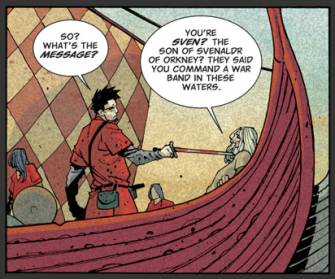 SPURGEON: In the first issue you're very quick to establish some of the negative aspects of your protagonist's personality, in that he aggressively goes after the combat that takes up the first few pages, and he kills the person who brings him the information about his father's passing. What's different about working with a lead that's not heroic? Is there something you find particularly appealing about that kind of character?
SPURGEON: In the first issue you're very quick to establish some of the negative aspects of your protagonist's personality, in that he aggressively goes after the combat that takes up the first few pages, and he kills the person who brings him the information about his father's passing. What's different about working with a lead that's not heroic? Is there something you find particularly appealing about that kind of character?
WOOD: I remember walking out of
Gladiator, the
Russell Crowe film, puzzled that we as viewers were meant to see Maximus as a hero. The movie
I just saw, he slaughtered his way through it, almost blind with a desire for murder and revenge. But I guess that's the times the movie portrays, and let's face it, Vikings killed people. They did a lot of other things as well, but they weren't shy to kill people. Their afterlife was a pretty great place as advertised, so I guess it must not have seemed like such a crime.
Anyway, I do prefer to write less-than-perfect characters and I know some readers don't have a lot of interest in reading characters like that. But like I've already said, I find it more interesting that way, and this is probably why I've not really pursued writing company-owned superheroes. I remember during the year I spent writing
Generation X for
Marvel, back in 1999, I would get into frequent arguments with my editor over his decree, which he said was Marvel's decree, that no matter what happens in a story, at the end of the 22 pages, the "hero" -- meaning the lead character(s) -- had to be nothing but heroic, blameless, spotless. I have zero interest in signing onto something like that. How lame... and boring! Stuff like that feels quaint and way out of date, belonging to a simpler, less cynical time.
In
Northlanders, Sven's an accomplished warrior and he's arrogant because of that. He didn't just kill that messenger, he and his men killed everyone in that boat. He'll change over the course of the story, get more complex, more open-minded, and more well-rounded.
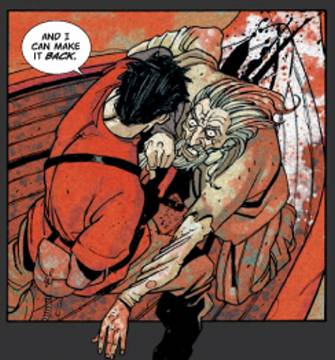 SPURGEON: I want to ask about the suggestions of theme in that first issue. The first one is the thought of returning home, which seems very up front in the work. Sven seems reluctant to return home, for good reason; at the same time, he appears intrigued by his own resistance to returning home, despite the potential for great wealth that would seem to provide an obvious motivation. Does this mirror any of your own experiences coming to terms with home and family and legacy? Is there something that strikes you about these issues that you don't see other people exploring in art?
SPURGEON: I want to ask about the suggestions of theme in that first issue. The first one is the thought of returning home, which seems very up front in the work. Sven seems reluctant to return home, for good reason; at the same time, he appears intrigued by his own resistance to returning home, despite the potential for great wealth that would seem to provide an obvious motivation. Does this mirror any of your own experiences coming to terms with home and family and legacy? Is there something that strikes you about these issues that you don't see other people exploring in art?
WOOD: I think the idea of a person returning home after a period of time is a classic theme that's been done thousands of times. Actually, just looking at Vertigo right now,
Loveless and
Scalped both work with that theme in different ways. Talk about relating to your reader... who doesn't have strong feelings, one way or the other, about their hometown? What about high school reunions? Ever fantasize about going back and kicking the ass of the bully that gave you such a hard time in the 8th grade? I know I have.

It took a tremendous effort on my part to leave my hometown, and really I was only able to because I inherited some money. For about ten years I had a real love/hate thing going on, and its only been after I was into my 30s that I could think about it all objectively. That's where
Local came from, my thoughts on the idea of hometowns, geographical locations and how they connect to us emotionally. In
Northlanders, Sven has nothing but loathing for where he comes from, but it can't be that black and white, can it? He comes off, initially, so dispassionate, walking the streets he ran in as a child, seeing familiar faces, and he's so unmoved. But it'll catch up to him. No one is that bulletproof.
SPURGEON: The other theme that initially presents itself is a discussion of man vs. nature. You return to not only the extreme elements Sven faces, but his hard-won inclinations when it comes to effectively dealing with them. Just the fact that you use such wide-open spaces in your work kind of sets this book apart from a lot of other titles. This seems like it might be further from your own experiences than some of the other plot points, but is man's ability to deal with harsh external circumstances a matter of interest to you?
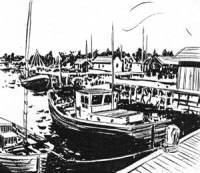 WOOD:
WOOD: Looking back at what first got me into Vikings, when I was young, a huge part of it was their environments. I'm not 100 percent sure why, but the idea, the mental image of these men stalking across frozen moors, or sailing their ships through icy waters, or fighting desperate battles on a rocky beach somewhere was thrilling. My family comes from Scotland and would talk about it often, and I visited there a few times in my teens, and I think that really cemented it for me. People who cope with rugged environments impress me, whether it be some island in the North Sea or a war-torn Manhattan or even a dysfunctional family... overcoming obstacles, being put through trials. Why is that so interesting to me, I wonder? I just know it is. Certainly I admire it in people. I think it makes for great reading. As a kid I was quite obsessed with
Jack London novels.
The Tourist is a book of mine that's very close to my heart for these exact reasons.
SPURGEON: Can you talk a little about Vertigo landing Demo
? Was it a difficult process in taking it from its initial publisher and finding it a home?
 WOOD:
WOOD: Yes and no. Vertigo seemed to have their eyes on it for a long time. I know that probably sounds predatory, but I don't mean it that way.
Demo was the book that got my editor, Will Dennis, interested in me as a writer, and I suspect the same thing happened with [
Demo artist]
Becky [Cloonan] and
Shelly Bond (she got in at Vertigo parallel but separate to me). So I know they liked the work, and I knew even back then that I would likely be taking the book away from
AiT when the contract expired, so in that respect it was easy. When I signed my exclusive deal with DC, we had an understanding, a handshake deal on the side that they would get
Demo when the time came. Becky and I were thrilled about it.
In the middle there, there was some awkwardness, because
AiT obviously would have preferred to keep the book. I have to hand it to AiT, though... way back when, in late 2004, I was having a frank conversation with them about what I could do to help, to help market my books to increase sales, to grow my career. I wanted a career in comics, all or nothing. I didn't want it to be what I did on the side after my real job was over for the day. But I wasn't going to get that selling the amount of books I was at the time. AiT was very honest and upfront and basically said, "This is it. We're a small shop and this is probably as good as it'll get for you here." So that was helpful, actually. It helped me take the next steps, to "level up." Within a month I had pitched
Local,
Supermarket and
DMZ (to
Oni,
IDW, Vertigo) and placed
The Tourist at Image.
And thinking about
Demo, its such an important book to both of us, to Becky and I, that we naturally want to give it a better chance to be out in the world, to reach more people. I look at what
Demo sold to date compared to the
DMZ trades, let's say, and its a difference of tens and tens of thousands of copies. There is a potential that the book hasn't reached yet.
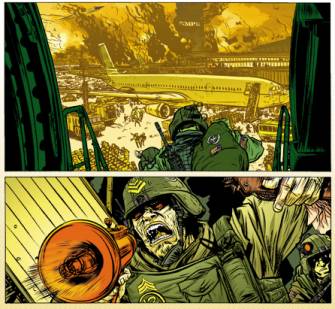 SPURGEON: Now that you're a couple of years into doing DMZ, has that experience been what you thought it would be? Has it been surprising in any way. On the one hand, there's a jumpiness and prickliness about political ideas as seen in the recent incident where Scott King was hassled at an airport because of some of the imagery in your comic; at the same time, we're a very satire-rich culture where you can say just about anything and it seems to become a part of things rather than dangerously standing out. Are you able to accomplish what you want to accomplish with DMZ given the tenor of the times?
SPURGEON: Now that you're a couple of years into doing DMZ, has that experience been what you thought it would be? Has it been surprising in any way. On the one hand, there's a jumpiness and prickliness about political ideas as seen in the recent incident where Scott King was hassled at an airport because of some of the imagery in your comic; at the same time, we're a very satire-rich culture where you can say just about anything and it seems to become a part of things rather than dangerously standing out. Are you able to accomplish what you want to accomplish with DMZ given the tenor of the times?
WOOD: Sometimes I am a little surprised it hasn't been received as more "shocking" than it has, considering current events, but like you said there is a lot of similar material out there. Everywhere I go, everyone I know, people are fully aware of how fucked up and shitty our government is, how illegal and crooked they are, and how wrong the war is. So
DMZ is preaching to the converted, absolutely, so what it takes to stand out is what angle you take, the style you work in.
DMZ definitely has its angle. And yeah, I am accomplishing what I want. I've not once been censored or talked out of anything by anyone at DC.
I feel like I am very lucky, very, very lucky to have this opportunity, to have a publisher and to have the means to write books and see them published and to say what I want to say in public. I don't want to blow that, or do it half-assed or be compromised. I never take my career for granted, so I try and make everything count. It was with
Demo that this first dawned on me. To sort of quote something
Matt Fraction says on a similar subject, it was time to start sticking my landings.
 SPURGEON: You recently attended the festival at Lucca, which is probably the European festival that's been most historically friendly to US creators but in many other ways is about as European a festival as exists. Now that you've had a little bit more time to reflect, how was that experience? Has it had an effect on how you look at your career, your industry?
SPURGEON: You recently attended the festival at Lucca, which is probably the European festival that's been most historically friendly to US creators but in many other ways is about as European a festival as exists. Now that you've had a little bit more time to reflect, how was that experience? Has it had an effect on how you look at your career, your industry?
WOOD: Those
columns I wrote for
Newsarama while I was there, I was having such a fantastic time I don't think you could have got a balanced report out of me if you had a gun to my head! But even with time to reflect, it really was amazing and it absolutely changed everything for me.
The biggest thing, speaking personally, was how I was received there. I knew the Italian-language
Demo had won a fan award, and I was working with a couple Italian artists...
Riccardo Burchielli, my
DMZ artist, is quite famous over there. But I considered my invitation to be more of a tag-along thing, but as the time neared, it seemed like I have a career there, a really good one, and a readership. This stunned me a bit because here in the US, I've spent ten years actively working my ass off to
build a career, but over there is just happened on its own with no efforts from me, really. I wasn't going to cons there, doing signings, spending time on their message boards, working with retailers... I simply arrived at Lucca where there were three books of mine in Italian being released for the show. There was a huge gallery exhibition for
DMZ, I won an award, similar to an
Eisner, for
Demo , and I had steady lines at my booth... something that
never happens here. And all on the strength of the work itself, not because I was good as self-promotion or someone was hyping me or taking me "under their wing," etc. It felt really good.
And the positivity... I'm sure that it exists to some degree, but I saw no negativity, no beefs, no snark, no rivalries. It was just this great show where comics are art, and I use that word properly, not capital-A art or art with finger quotes around it but a legitimate art form, like it should be everywhere. Imagine an industry that's truly balanced, where the overall output resembles more the catalog from
First Second than it does the Marvel insert in
Previews. Where instead of being stuck in a warehouse convention center somewhere, the show warrants an immense outdoor set-up in
one of the most beautiful medieval cities in Europe? I dunno, Tom... I don't know how it could have been better. The people were warm and happy and friendly, the food was amazing, the energy nothing but positive. It makes a lot of shit we deal with completely irrelevant. I come back to the states and see things like
this, where people I don't even know are mad at me for having a good time in Lucca? Being there gave me a perspective on things that has made me happier overall, and I'm untouched by the negativity here now. It's just not worth thinking about. It's not worth anything at all, really.
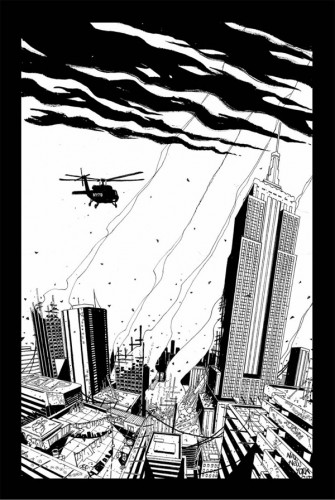 SPURGEON: Brian, I know that you've said your piece about articles on sales estimates, but one thing that interested me is that it made me think about how long you've been actively on-line as a creator. Have you ever thought about how that aspect of comics has perhaps had an effect on your career, or how things have changed on-line since you started participating in forums and the like?
SPURGEON: Brian, I know that you've said your piece about articles on sales estimates, but one thing that interested me is that it made me think about how long you've been actively on-line as a creator. Have you ever thought about how that aspect of comics has perhaps had an effect on your career, or how things have changed on-line since you started participating in forums and the like?
WOOD: I think it's had a profound effect on my career. I was entirely ignorant of the internet when I first started, but when I did get online (1998) and started poking around, the first place of interest I stumbled across was
Warren Ellis' old
Delphi forum, the WEF -- I immediately made my own, lesser forum, which I ran for something like six years. The WEF is really where I came up, learning a lot from Warren, who gave me advice and assistance any time I asked. Now, there are days I wish the internet never existed, it can get so frustrating, especially and most recently with the shit about the sales estimate charts. That's a funny thing, actually, seeing bloggers rake me over the coals about it and claim I have no fucking idea what I'm talking about, while at the same time getting emails from a whole bunch of creators thanking me for speaking up.
Obviously, being active online is crucial to any creator's career, but its a minefield. I had a dark period of a couple years when I was making books for AiT and also working a day job that was, all melodrama aside, crushing my soul. Comics just felt like a hobby at the time -- I wasn't yet taking it seriously -- and I would blow off a lot of steam on the message boards and made a lot of people dislike me, intensely in some cases. I'm still digging myself out from that, actually, some 4+ years after it all. Very, very ugly, all of it. Stupid choices on my part, aligning myself with the wrong people, and not taking anything as seriously as I should.
SPURGEON: As someone with a displayed appreciation for the political nature of a delivery process. Do you have any thoughts about the decline of the comic book in general? Is there anything that comics potentially loses by changing from a series of tiny booklets distributed in independently owned, almost hidden shops into a bunch of book sold in a Barnes and Noble, for example?
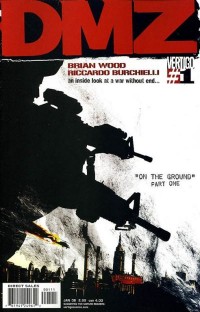 WOOD:
WOOD: Tom, I've spent pretty much my entire career writing these creator-owned black and white books for the small presses and struggling to make a career out of it. As far as I'm concerned, the idea of tiny booklets in hidden shops can just up and die already. I'm sick of it. Did you know that prior to
DMZ, there was not one year where comics made me the equivalent of minimum wage? My first check for
DMZ (a script and a cover) was equal to an entire year's worth of royalties on my back catalog. As far as I'm concerned, and I want this to be true for me and everyone else in comics, the more our books are sold in Barnes and Noble, the better.
The decline of singles does worry me, though, mostly from a financial standpoint. As a reader, I am firmly on board with trades and graphic novels. It puts me in a funny position. I see lots of "solutions" floated online about how companies, like Vertigo, should ditch the idea of monthlies altogether and publish the trades. Instead of
DMZ singles every month, you'd get a
DMZ graphic novel every months. Sounds good, but that's a
lot of ad revenue lost, killing the single issues, as well as income from sales. Would I still get my page rate for writing
DMZ, or would it be more of a book deal, an advance against royalties? Could I still pay my mortgage and feed my kid's college fund? Could DC still cover its costs? I really don't know.
SPURGEON: How will you know when Northlanders
is a success?
WOOD: In increments. What is it selling on its first issue? Where's it at when the monthly orders stabilize? Will it get collected? Will that sell well? Can I keep going? A series of small victories over time will tell me.
*****
*
cover to the first issue of Northlanders, out this week in Direct Market retail establishments
*
publicity photo provided by Wood
*
seven bits from sequences in Northlanders #1
*
from The Tourist, with Toby Cypress
*
from Demo, with Becky Cloonan
*
from DMZ, Wood's modest yet definite break-out hit at Vertigo
*
photo from this year's Lucca Festival, provided by Wood
*
two more from DMZ, the latter being the first issue's cover
*
a full page from the first issue of Northlanders, emphasizing empty space
*****
Northlanders, ongoing comic book series, Vertigo, first issue out 12/5/2007
*****



